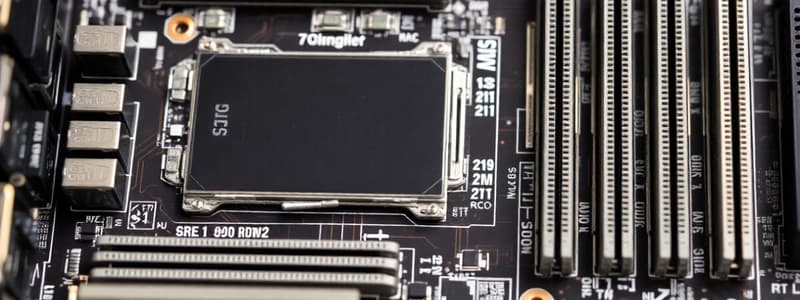Podcast
Questions and Answers
What primarily determines the compatibility of a CPU with a motherboard?
What primarily determines the compatibility of a CPU with a motherboard?
- The type of CPU socket (correct)
- The amount of memory installed
- The brand of the power supply
- The operating system being used
When deciding between an Intel or AMD motherboard, which factor is often considered?
When deciding between an Intel or AMD motherboard, which factor is often considered?
- The performance ratings of the CPU (correct)
- The color of the motherboard
- The warranty of the motherboard
- The shape of the CPU cooler
What is a key difference that locks the decision between using an AMD or Intel CPU?
What is a key difference that locks the decision between using an AMD or Intel CPU?
- The motherboard size
- The price of the power supply
- The cooling system compatibility
- The design and operation of the CPUs (correct)
Why might server motherboards have multiple CPU sockets?
Why might server motherboards have multiple CPU sockets?
What feature is common in most server motherboards?
What feature is common in most server motherboards?
Which configuration is typically not feasible when choosing between AMD and Intel?
Which configuration is typically not feasible when choosing between AMD and Intel?
What might influence the choice between an AMD CPU and an Intel CPU over time?
What might influence the choice between an AMD CPU and an Intel CPU over time?
What is an important first step when building a computer regarding the CPU?
What is an important first step when building a computer regarding the CPU?
What is a key feature of desktop motherboards compared to laptop motherboards?
What is a key feature of desktop motherboards compared to laptop motherboards?
What is a common characteristic of laptop CPUs?
What is a common characteristic of laptop CPUs?
What happens when a laptop system overheats?
What happens when a laptop system overheats?
Why are laptop motherboards generally considered less customizable?
Why are laptop motherboards generally considered less customizable?
What is unique about laptop motherboards compared to desktop motherboards?
What is unique about laptop motherboards compared to desktop motherboards?
What is a limitation of replacing a laptop motherboard?
What is a limitation of replacing a laptop motherboard?
What is a typical number of expansion slots found on a standard desktop motherboard?
What is a typical number of expansion slots found on a standard desktop motherboard?
Why might a user find a desktop motherboard more flexible than a laptop motherboard?
Why might a user find a desktop motherboard more flexible than a laptop motherboard?
Which of the following characteristics is NOT true about laptop motherboards?
Which of the following characteristics is NOT true about laptop motherboards?
Which of the following statements best describes the design principle of laptop motherboards?
Which of the following statements best describes the design principle of laptop motherboards?
Flashcards
Intel vs. AMD
Intel vs. AMD
Intel and AMD are two major CPU manufacturers. Each has its own design and socket, preventing interchangeability.
CPU's Influence on Motherboard
CPU's Influence on Motherboard
The choice of CPU manufacturer (Intel or AMD) affects the entire motherboard's compatibility and design.
Factors in Choosing Intel or AMD
Factors in Choosing Intel or AMD
The choice between Intel and AMD is usually based on factors like cost, performance, and specific needs.
Traditional AMD vs. Intel Perception
Traditional AMD vs. Intel Perception
Signup and view all the flashcards
Server Motherboard CPU Sockets
Server Motherboard CPU Sockets
Signup and view all the flashcards
Server Motherboard Memory Slots
Server Motherboard Memory Slots
Signup and view all the flashcards
Server Motherboard Expansion Slots
Server Motherboard Expansion Slots
Signup and view all the flashcards
Rack-Mounted Server Form Factor
Rack-Mounted Server Form Factor
Signup and view all the flashcards
Motherboard: What is it?
Motherboard: What is it?
Signup and view all the flashcards
Desktop Motherboard: Variety
Desktop Motherboard: Variety
Signup and view all the flashcards
Server Motherboard: Focus
Server Motherboard: Focus
Signup and view all the flashcards
Laptop Motherboard: Portable
Laptop Motherboard: Portable
Signup and view all the flashcards
ATX Motherboard: Standard
ATX Motherboard: Standard
Signup and view all the flashcards
Laptop Motherboard: Proprietary
Laptop Motherboard: Proprietary
Signup and view all the flashcards
Laptop CPU: Efficiency
Laptop CPU: Efficiency
Signup and view all the flashcards
Desktop System: Upgradability
Desktop System: Upgradability
Signup and view all the flashcards
Laptop Cooling: Throttling
Laptop Cooling: Throttling
Signup and view all the flashcards
Motherboard: Slots, Connectors
Motherboard: Slots, Connectors
Signup and view all the flashcards
Study Notes
Computer Motherboard Types
- Motherboards are categorized by CPU manufacturer (Intel or AMD)
- This choice dictates compatibility with other motherboard components
- Cost and performance are often factors in the decision.
- CPU and socket designs differ significantly between brands, thus not interchangeable
- Functionality changes based on the type of computer (e.g., desktop, server, laptop)
Desktop Motherboards
- Desktop motherboards can have single or multiple CPU sockets
- Memory slots vary between 2 and 4+
- Expansion slots for adding features
- Configurations range from full-sized to compact form factors (including all-in-one)
Server Motherboards
- Usually designed for multiple CPUs for high performance and scalability
- Typically have multiple slots for memory expansion
- Designed for rack-mounted installation
- Many expansion slots are available
Laptop Motherboards
- Primacy on portability and low power consumption.
- CPU design prioritizes efficiency over raw speed
- CPU throttles to prevent overheating
- Customization is significantly more limited than in desktops
- Motherboards are unique to specific laptop models, non-interchangeable
- Replacement requires an exact match for the motherboard.
CPU Installation
- CPU installation is similar across brands; a cover secures the CPU
- Servers may have multi-CPU configurations, allowing upgrades
Studying That Suits You
Use AI to generate personalized quizzes and flashcards to suit your learning preferences.


